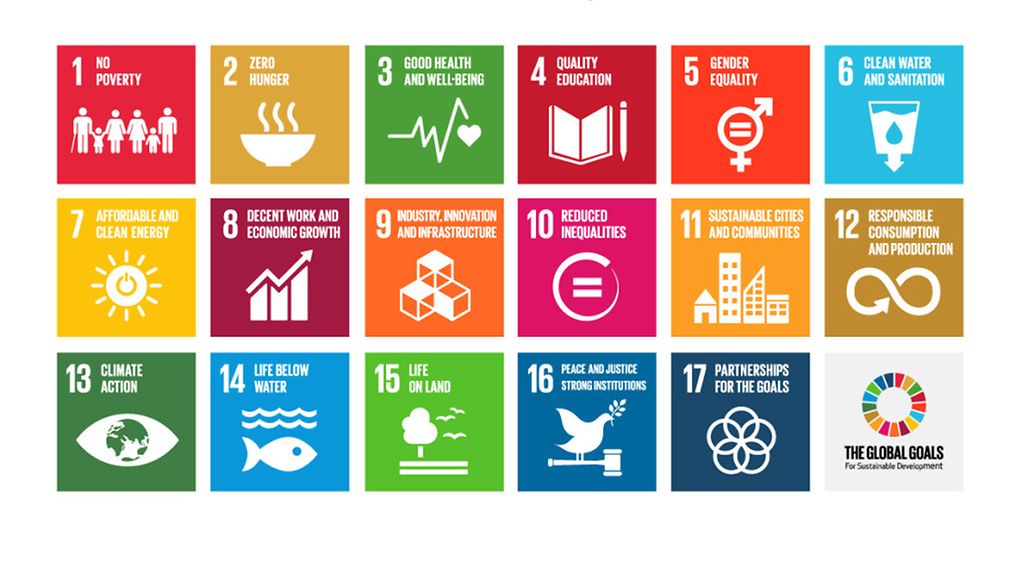A future in which nature and the climate are protected, fewer people suffer from hardship and social cohesion is maintained – these and others are the objectives being pursued by Germany through its Sustainable Development Strategy, whereby the focus transcends national borders. And rapid action is required, as the international community has set itself a deadline.
7 min reading time

Almost always a question of sustainability: decisions
Photo: ESA
In order to ensure that important areas of human coexistence are on the right track by 2030, the 193 member states of the United Nations have defined 17 goals for sustainable global development, ranging from combating hunger and poverty to affordable and clean energy, climate protection and the creation of viable, sustainable cities.
The German Sustainable Development Strategy has also been oriented towards these 17 global goals since 2016.

The Global Goals
Photo: www.globalgoals.org
The Federal Cabinet approved their further development on the 10 March 2021.
The inclusion of the 17 sustainability goals (SDGs) has brought the German Sustainable Development Strategy to a wider international audience. This means that in order to achieve these objectives by 2030, the Federal Government will be looking beyond Germany to the global level, as Germany also has the ability to implement development assistance funds and measures to exert international influence in implementing the respective goals.
More rapid implementation
All countries around the world must intensify their efforts as it is not possible to meet the sustainability goals at the current pace. Failure to do so would make it impossible to achieve such goals as the eradication of poverty and hunger, which are widespread in many countries, by 2030.
For example, the Federal Government aims to advance the energy transition in Germany, thereby also contributing to the fight against climate change. Another sustainable development objective is gender equality (SDG 5), which concerns such issues as equal pay for men and women and ensuring an appropriate proportion of female managers in companies.
Ambitious transformation required
Achieving the objectives of the German Sustainable Development Strategy and the 2030 Agenda will require an ambitious transformation, which is why the Federal Government plans to take action in important areas such as the energy sector, climate protection, the circular economy, housing, transport, food, and agriculture.
The Federal Government’s coalition agreement refers to the need for a transformation of various aspects of the economy and society.
Sustainability in concrete terms: protecting the climate and public health
In relation to energy production and climate protection, the Sustainable Development Strategy, which was further refined in 2021, promotes more rapid implementation of the 13th Global Sustainability Goal ("climate protection measures"). The Federal Government passed a Climate Protection Act to this end in 2019, which was amended in 2021: according to this, Germany is to achieve greenhouse gas neutrality by 2045. Steadily decreasing emission levels have already been specified for this purpose.
In terms of the third Sustainable Development Goal (SDG) "Health and Wellbeing" (SDG 3), the Federal Government is committed to improving global health, not least with a view to combating so-called zoonoses, i.e., infectious diseases that can occur in both animals and humans.
Setbacks due to the Covid-19 pandemic
In terms of timing and substance, the Sustainable Development Strategy was last updated against the backdrop of the Covid-19 pandemic, which highlighted how severe an impact any threat to the third sustainability goal, "Health and Wellbeing", can have on all areas of life and consequently on all other sustainability goals.
Setbacks in global poverty reduction have occurred as a result of the pandemic. In contrast, there has been an increase in awareness of the importance of the fundamental resources, which has led to renewed debate about the best way to move towards a sustainable future.
Much remains to be done
An expert report on sustainability policy (Peer Review) published in June 2018 and the various public dialogue events held in 2019/2020 included praise for the existing German Sustainable Development Strategy as well as indicating a need for further change.
Experience of implementing the 2030 Agenda to date, both at the national and global levels, has shown that we are capable of increasing our sustainability. At the same time it is clear that we still have much to do, as in many areas, even in Germany, we are still a long way from a sustainable economy and lifestyle.
In August 2021, the Federal Government published a paper on the outlook for the 2030 Agenda, in which it emphasised the need for significant progress. The paper reviews the sustainability policy challenges for the legislative period following the Bundestag elections in September 2021.
Broad participation in the update process
Under the chairmanship of the Head of the Chancellery, all ministries and the State Secretaries' Committee for Sustainable Development participated in the development of the Sustainable Development Strategy between 2019 and 2021. Comments from the public received during an online consultation conducted by the Federal Government's Press and Information Office were also included, as were position statements received from the "Sustainability Forum", which the Chancellor's Office invites leading stakeholders in the field of sustainability to take part in every year.
With the involvement of all relevant social stakeholders, the Federal Government will continue pursue the strategy and its implementation with dedication and commitment. A comprehensive review and update of the strategy is scheduled for 2023/2024.
Origins
A Sustainable Development Strategy was first adopted in 2002 and was then updated at regular intervals. In each case, the respective adapted strategy determines the trajectory of sustainable development in our country.
Sustainability means only felling as many trees as can grow back; living off the yield rather than from the substance. In terms of society, this means that each generation must solve its own challenges and not burden future generations with them.
Everyone has a part to play when it comes to sustainability . Decisions on sustainability are made by investors, producers, and consumers, whereby it is not about an ethic of sacrifice. Instead, what it requires is imagination, creativity, and technical know-how to promote patterns of production and consumption that are environmentally friendly and conserve resources. To this end, everyone from employees and companies, trade unions and business associations, to universities and research institutions, must play an active role in shaping structural change.
The guiding principles of sustainability
Intergenerational justice, quality of life, social cohesion, and international responsibility are the guiding principles of the German Sustainable Development Strategy. Based on these guiding principles, the Sustainable Development Strategy sets out a number of indicators with medium- and long-term targets.
Germany is on the right track: we now generate about 43 percent of our electricity from renewable energy sources, which significantly reduces greenhouse gas emissions.
Looking forward
The United Nations committed to sustainable development as a guiding principle back in 1992, when a global action programme known as "Agenda 21” was adopted in Rio de Janeiro. Each of the more than 170 signatory states agreed to implement the guiding principle at the national level in all policy areas with the participation of the general public and the commercial sector. Germany was among the countries that signed the agreement.
The Federal Government presented the National Sustainable Development Strategy "Perspectives for Germany” in 2002. A programme of measures adopted in 2010 identified a number of tasks and objectives aimed at achieving the sustainability goals within the Federal Government's sphere of responsibility.
Programme of measures and reports (only German)
Both the strategy and the individual measures undergo continuous revision and development, and the Federal Government publishes regular progress reports every four years. Indicator reports published at two-year intervals provide detailed information on the development of the core areas of sustainable policy in Germany.
An ongoing task
Sustainable development means using vision, imagination, and creativity to shape the future, and having the courage to try new things and explore unfamiliar avenues. It is about how we would like to live in the future, and how we respond to issues of the globalised world both in the economy and in society.
As such, the content of the strategy is comprehensive but not exhaustive: it informs policy reforms as well as providing a basis for changing the behaviour of businesses and consumers.
Well beyond the ecological challenges, the concept serves as an action guide for a comprehensive sustainable policy. It is about accepting cross-generational responsibility for economically, ecologically, and socially sustainable development.